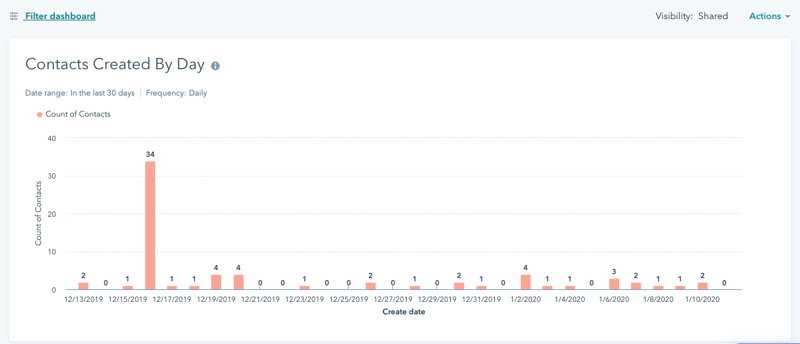The business of sales can be either be a dream or a nightmare for some. There are some acquaintances I know who started sales and vowed never to go back, "Sales is not for me!" they said.
Like the old saying "First impressions count" stands true in how we are introduced to sales. I have had some pretty crazy sales onboarding experiences when entering into new companies or departments where I've had to figure it out all on my own.
Also, most employee onboarding sessions in sales are mainly product and company-specific (orientations) and not sales-specific which ultimately results in someone having a successful, mediocre, or unsuccessful period in sales.
For those of you who are new to sales or taking up a new sales role in a different department or company, here is a guide to give you the best start within your first ninety (90) days.
Days 1-30

Your first thirty days at a new sales role mainly involves absorbing as much information as possible.
Here is a break down of some of those things or activities.
Acquaint yourself with the Company, its Goals and Culture
Take the time to familiarise yourself with the company's background, mission, vision, how they do things, etc. also try meeting with as many stakeholders from different departments as possible.
Doing this will broaden your understanding of the organisation, the people, their roles, etc., and give you a better appreciation of your contribution to the organisation (The Bigger Picture) and not just your department.
Learn the Industry and the Competition
Read as many publications about the company latest moves within the industry, any recent milestones, changes in government legislation, etc. (Follow a P.E.S.T.L.E model in your research)
Your team lead, sales manager, the department head can brief you on any recent trends or changes that are not published. Also, a great source of information would be your new sales colleagues as they would have on the field experience.
It's recommended to study your competitors as well as not just from a product or service comparison but from what things are they doing or not doing that you can learn from. Companies should have this in a sales playbook, but if they do not then you will have to do this research yourself.
Introducing yourself to your new customer base is also an opportunity to gain knowledge as you can use this introductory meeting as a discovery call to understand more of them, your company, and the industry.
Note: Seasoned sales professional that may have industry experience, don't take it for granted that you know everything. Use some of these strategies to help guide you into your new role with your new customer.
Product Knowledge & Certifications
You must be proficient in what you sell!
While this might be a no brainer, we have seen sales professionals not take this seriously and have poor sales results because of it.
Based on the industry or type of services you offer it may take more than 30 days but it's strongly recommended that you get on this as soon as possible.
Understand the Value Proposition
As you become more familiar with the company, industry, and products you would now have a better understanding and appreciation of the value your organisation's products, services or solutions offer and the specific problems it solves.
Take the time to learn more about the 5 Main Value Proposition Categories being Productivity, Profitability, Image, Convenience & Experience. This will help tremendously in your sales approach/sales pitch.
Another good resource to broaden your knowledge is reading Harvard Business Article where they expand the value proposition categories to approximately 40 different categories.
Learn your Ideal Customer Profiles (ICPs) & Personas
ICPs: Every product has a buyer and as a new sales professional it's important that you understand who these buyers are.
Far too often we have seen sales professionals throwing mud on the wall with their prospecting efforts wasting time behind leads that do not fit their product, service, solution, or even their company.
Read: #1 Step In Prospecting
Take the time to learn this through your company's sales playbook. If you do not have a playbook, sit with your sales manager and sales colleagues to have an idea as to who are the best fits clients.
Buyer Personas: Once you've identified the buyer profile, you will now need to learn who are the people to speak with during the course of the sales process.
B2B and B2C sales have become complex with different persons that are involved at different stages in the buyer's journey.
Have a clear focus on these two to make sure that your activity is focused on the right type of client.
Ride Alongs
(Sales Managers & Sales reps.)
Within your third or fourth week ask your manager or team lead to shadow him/her or one of their top sales reps for some days.
Also, if your department interacts with other business units such as finance, logistics, operations, etc. block some time to meet with them to learn their process.
Understand Your KPI(s)
Dialogue:
Sales Professional: Mr. CEO, what are your expectations of us?
CEO: What sport do you like?
Sales Professional: Cricket
CEO: What's the role of the batsmen especially the first 5?
Sales Professional: To make runs for the team
CEO: Then, that's my expectation of you guys.
The above was an actual conversation between a sales professional and a CEO.
Sales is a vital part of any company's success regardless of the size. It's important that everyone who has a part to play in enabling sales understands their role. As a sales professional just starting or if you are new to an industry, company or department, take the time to understand your Key Performance Indicators (KPIs) which comprise of sales targets, objectives, activity goals, etc. and how you will be measured against them.
Make it a practice to sit with your sales leader because they can help you map out a daily, weekly, monthly sales activity/success plan.
.jpg?width=750&name=OPAAT-SWY%20Youtube%20Artwork%20(5).jpg)
31-60 Days
Here is where you start applying what you initially learned.
As a former sales manager, I personally like getting new reps active within the last week of the first month but every manager and industry is different as some sales professionals cannot start selling unless licensed/certified. Once you are, here are some of the things we suggest you start doing.
Get your hands on your customer listing
You can't sell if you don't have customers, correct?
So get your hands on that customer listing as soon as possible. This list is your bread and butter so take the time to really familiarise yourself with the data and customers.
We would suggest you segment your customers into the following categories;
-
Key accounts
-
High revenue earners
-
Average deal size/tiers (Silver, Gold, and Platinum)
-
Active and inactive (Last time purchased/contacted)
-
List the key personas
-
Identify accounts you would like to grow i.e (Silver to Gold, Gold to Platinum, Platinum Plus)
Support from your sales manager/team leader is important in the success of this as they may have insight about certain accounts, personas, key approaches that you may need to be aware of.
Start Your Outreach
As a new sales professional, I've always found it to be one of the easier opportunities in meeting with current and potential clients.
Develop a sales approach with marketing to push this introduction to your customers. However, don't forget that personalisation is the key. First impressions go a long way and in 2021 we encourage you to use technology to help facilitate new approaches.
Things to keep in mind when making those calls or emails;
-
Time
-
Value Proposition
-
Personas
-
Call Objective
-
CTA
Note: Practice this with your team and sales manager
Start Meeting with Clients
We know meeting with clients can get new sales professionals the jitters sometimes but it's par-de-course in the sales world.
What helps is being prepared for each meeting. Remember we listed a few things to keep in mind with each call earlier? Well, the same thing applies to client meetings.
If it's your first meeting, as an introduction, we suggest you approach it like a discovery session. Here are a few best practices to make sure you get that meeting done properly;
1. Always check in with the client the day before and the morning of the meeting to confirm it's still on.
2. Research the client history with your organisation and in their industry
3. Practice your value proposition
4. Double-check to make sure you are meeting the right people (decision-makers) if not, ask if they can be invited to the meeting.
5. Have your questions or notes written down for the meeting
6. Have an objective
7. Be on time (Start and end on time)
While there are many other points to note we feel these seven (7) are the most important points to note.
Log your activity, build your pipeline

Earlier we said that understanding your KPI(s) is a key component to your success. Tracking that activity is also important as it helps you understand the areas you are doing well and where you need to improve. Using your CRM helps you and your team lead to identify quick wins and areas of improvement.
While there are many companies that still use traditional platforms like Microsoft Excel to track sales activity, we strongly recommend they change this approach as using Excel is very slow, labour intensive, and inaccurate for both the sales professional and the sales leader.
It also brings no major business analytics or sales intelligence to the organisation without someone having to spend time looking at the data.
 Have a routine for prospecting, making calls, visits, demos, etc.
Have a routine for prospecting, making calls, visits, demos, etc.
There's a lot of repetition in sales which can become monotonous but you can make it fun. Sales require discipline and structure and it's important that you develop both.
Without it, we will find ourselves being run by whatever the day throws at us and not achieving any of our activity goals toward hitting those KPIs. Develop a routine/schedule on which days you want to make calls, set meetings, do demos with clients, etc. This approach can help you feel less overwhelmed and keep you more productive.
Review your activity with your sales manager
Your sales manager/team lead is your go-to person in making sure you will be successful in this role. Based on your probation period, we recommend you do weekly, bi-weekly or monthly check-ins with him/her.
Note: As time goes on in the probationary process you will need to show initiative and the check-ins will be less. Be disciplined and accountable and all should be fine.

61-90 Days
At this stage, you should have a flow of what's happening in your daily, weekly, and monthly activities. You should start getting an appreciation of what's working what's not and what adjustments you need to make.
It's also the tail end of your probation and if you are really serious about securing the job, then we recommend you do the following:
Increasing your sales activity
Sales is a series of repeatable tasks that once mastered, you find yourself flowing through the process smoothly. The key thing here is not getting complacent and recognizing that more can be done.
Look at ways to increase your sale activity (calls, meetings, etc.) or improve the quality of what you do so you can secure/attract, engage, and get a commitment from high-valued clients.
You don't go to the gym to lift the same weight over and over
.gif?width=750&name=Website%20%20Landing%20Page%20(1).gif)
Create a social media presence
Being in the digital era, the use of social media in sales is a must. As a sales professional, it's a great platform to showcase your brand and show your expertise. The good thing is that you get to use the same principles learned like value proposition, customer profile, personas, etc. to really be specific to your message.
The platforms we recommend are:
-
LinkedIn
-
Instagram
-
Facebook
-
WhatsApp
While this could have been suggested earlier we felt it best that you take the time to get down the fundamentals of sales, your product, your offer, etc. first before jumping on social media, getting distracted, and making a mess of things.
Note: Check with your organisation's marketing head or your team lead to understand if there are any social media protocols.
.gif?width=800&name=Website%20%20Landing%20Page%20(2).gif)
There you have it! That's your guide to getting your first 90 days in sales off on the right track.
But here is one last point: Sales, like everything, requires discipline, commitment and hard work. It's not about you or your numbers but about your customer.
If you focus on serving your customers better, listening to their concerns, building a genuine relationship with them then that will be your start to having a successful career in sales.
The activities matter, but your character and approach to business is just as important.

RELATED SALES ARTICLES
Differentiation: The Missing Link in The Caribbean’s Sales Industry
Trinidad and Tobago—and the wider Caribbean—has a unique set of challenges, especially for businesses in mature industries like ...
Start Reading
100+ Sales and Marketing Terminologies You Should Know
Just as quickly as the tech world has been evolving over the last 10 years, so too has the world of sales and marketing. For ...
Start Reading
Seven (7) Questions Car Sales Reps Should Be Asking Customers
Some years ago I lost a $150K deal because of a $5K missing piece of plastic. Was it the fault of the product? No, it was my ...
Start Reading


.jpg?width=575&name=OPAAT-SWY%20Youtube%20Artwork%20(4).jpg)
.gif?width=300&name=Logos%20(1).gif)
.gif?width=700&name=OPAAT-SWY%20Youtube%20Artwork%20(5).gif)
.gif?width=750&name=OPAAT-SWY%20Youtube%20Artwork%20(7).gif)
COMMENTS